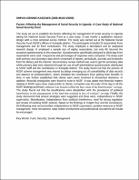| dc.description.abstract | OMVIA DENNIS KAGGWA (2008-M102-20069)
Factors Affecting the Management of Social Security in Uganda: A Case Study of National Social Security Fund
The study set out to establish the factors affecting the management of social security in Uganda taking the National Social Security Fund as a case study. It was mainly a qualitative research design with a cross sectional survey method. The study was carried out at the National Social Security Fund (NSSF) offices in Kampala district. The participants included 20 respondents from management and 40 from contributors. The study employed a descriptive and an analytical research design. It employed a sample size of eighty respondents, but only 68 returned the answered questionnaires to the researcher. Questionnaires specifically designed to elicit data from respondents were used. Frequencies and percentages of responses were computed. The study used both primary and secondary data which comprised of reports, periodicals, journals and textbooks from the library and the internet. Documentary review method was used to get the secondary data while primary data were obtained through the use of self-administered questionnaires distributed to NSSF staff and the contributors in Kampala district. The study found out that the process of NSSF scheme management was marred by delays emerging out of unavailability of data records and absence of professionalism, which inhibited the contributors from getting their benefits in time; it was further established that clients were never involved in investment decisions; in addition, financial ambiguities were found to exist in NSSF. It was added that financial matters relating to NSSF were never made public to clients; corruption was the order of the day in all the NSSF dealings and finally inflation was found to affect the face value of the beneficiaries‟ savings. The study found out that the beneficiaries were dissatisfied with the prevalence of political interference in the management of the fund that resulted in loss of workers‟ savings. Finally, the study discovered that several strategies were suggested and these were; independence in NSSF supervision, liberalisation, independence from political interference, need for strong regulation and review of existing NSSF policies. Based on the findings in chapter four and the conclusions, the following were recommended; independence in NSSF supervision, punitive measures to NSSF management, merit recruitment, stake holder involvement and professional recruitment all should be encouraged.
Key Words: Fund, Security, Social, Management | en_US |


